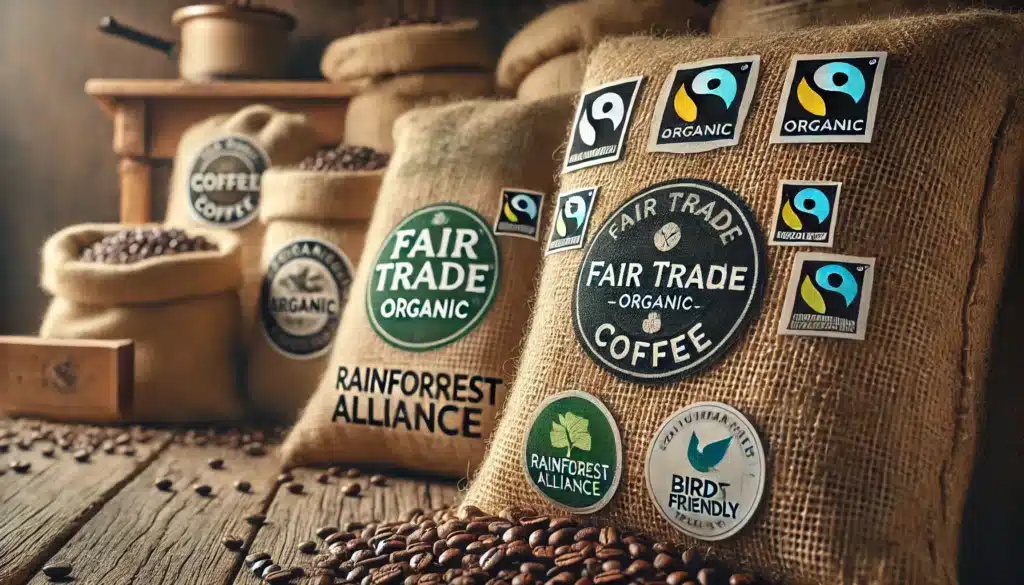Coffee certifications like Fair Trade, Organic, and Rainforest Alliance are becoming increasingly common on coffee packaging. But what do these certifications really mean, and how do they influence coffee quality and consumer decision-making?
In this article, we explore the role of coffee certifications, how they impact the coffee supply chain, and why they matter for both consumers and producers.
1. What Are Coffee Certifications?
Coffee certifications are labels given to coffee that meets certain standards. These certifications indicate that the coffee was produced according to specific environmental, social, and quality criteria. They help consumers make informed choices about:
- Environmental impact (e.g., sustainable farming)
- Social responsibility (e.g., fair wages)
- Health (e.g., chemical-free coffee)
Each certification has its own standards, and some farms may hold multiple certifications.
2. Fair Trade: Ensuring Fair Prices for Farmers
Fair Trade certification guarantees that coffee farmers receive a fair price for their crops, which is often higher than the conventional market price.
Benefits of Fair Trade include:
- Minimum price guarantees to protect farmers from market volatility
- Social premiums for community development
- Support for worker’s rights and safe working conditions
For consumers, Fair Trade coffee is a way to support social justice and economic stability in coffee-growing regions.
3. Organic Coffee: Promoting Healthier Farming Practices
Organic certification ensures that coffee is grown without the use of synthetic pesticides or fertilizers. It promotes:
- Soil health through crop rotation and composting
- Biodiversity by avoiding harmful chemicals
- Cleaner drinking water by reducing contamination from agrochemicals
Organic coffee often reflects a health-conscious approach to both farming and consumption.
4. Rainforest Alliance: Protecting Ecosystems and Biodiversity
The Rainforest Alliance certification focuses on environmental sustainability. Farms must meet criteria that protect:
- Forest ecosystems and wildlife habitats
- Water quality and soil health
- Fair labor practices and community development
Rainforest Alliance coffee supports biodiversity and climate resilience, helping to protect coffee-growing regions from environmental damage.
5. Bird Friendly®: Shade-Grown Coffee for Wildlife
Bird Friendly® certification goes beyond traditional shade-grown coffee. It requires that coffee farms:
- Provide habitat for birds and other wildlife
- Use natural fertilizers and avoid pesticides
- Contribute to biodiversity conservation
Choosing Bird Friendly® coffee supports both conservation efforts and sustainable farming practices.
6. Direct Trade: Bypassing Middlemen for Fairer Prices
In direct trade, roasters establish direct relationships with coffee farmers, bypassing the traditional supply chain middlemen. This model benefits both parties by:
- Allowing farmers to earn more for their coffee
- Giving consumers access to higher-quality coffee
- Encouraging transparency in sourcing
Though not a certification, direct trade is a valuable alternative for ethical consumers.
7. UTZ Certified: Improving Farmer Livelihoods
The UTZ certification focuses on improving the livelihoods of farmers by promoting sustainable farming practices and ensuring fair working conditions. UTZ-certified farms are required to:
- Minimize environmental impact
- Improve farm productivity
- Provide better wages and training for workers
The UTZ program also offers traceability, so consumers can track the journey of their coffee.
8. Specialty Coffee Association (SCA) Certification
The Specialty Coffee Association (SCA) certification focuses on quality standards for coffee at every stage of the supply chain. The SCA evaluates:
- Farm practices
- Processing methods
- Roasting techniques
- Brewing standards
An SCA-certified coffee ensures that the beans meet high-quality standards and have been handled with care.
9. Certifications and Coffee Quality
While certifications focus on ethical and sustainable practices, they can also signal higher quality coffee.
- Organic coffee tends to have cleaner, more vibrant flavors
- Fair Trade and Direct Trade often result in smaller farms with more focus on flavor profiles
- Rainforest Alliance and Bird Friendly® coffee promotes sustainable farming, which can improve taste consistency
In short, certifications often indicate high-quality coffee, produced with care and attention to detail.
10. Consumer Choice: Supporting a Better Coffee Industry
For consumers, coffee certifications offer a way to make a positive impact through everyday choices. By selecting certified coffee, you:
- Support ethical labor practices
- Promote sustainable farming
- Contribute to conservation efforts and environmental protection
Choosing coffee with a certification allows you to align your values with your purchasing power.
Final Thoughts: Certifications Matter
Coffee certifications help bridge the gap between consumers and coffee producers, ensuring that the coffee you drink is not only tasty but also ethically sourced and environmentally friendly. These certifications drive positive change in the industry and encourage transparency, making it easier for you to support sustainable practices and fair treatment for coffee farmers.







